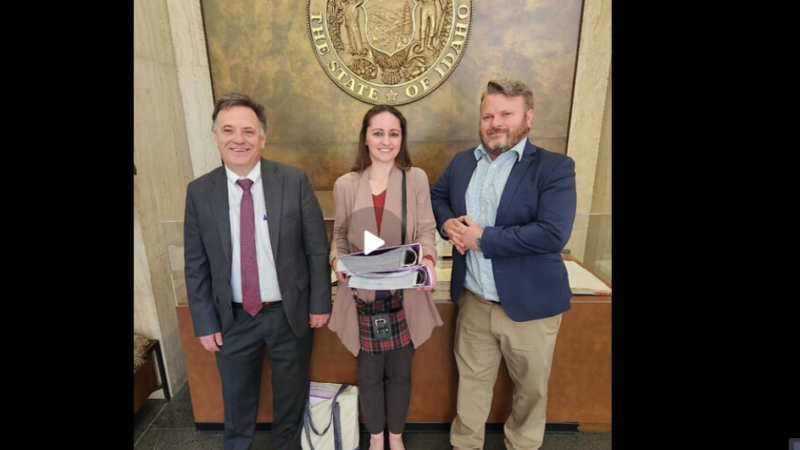Senators to vote on H393. Tell them Vote NO. Stop the Waste!

This program was developed in response to the original Affordable Care Act (ACA). If the portion of the ACA impacting the program is repealed and/or replaced then there may not be mandated coverage for immunizations. Allowing this section of code to sunset will be a part of the solution to the health insurance crisis that our state is facing. There is so much waste. You can see in their meeting minutes that they have been audited every single year because of poor accounting practices. They had to outsource the accounting which costs even more money. Vaccines for children are already covered by a federal program. We need to illuminate the waste of overbuying vaccines.
UPDATE FEB 5, 2018:
H 393 passed the house — Remember these names for future reference.
AYES – Amador, Anderson, Anderst, Armstrong, Barbieri, Bell, Blanksma, Burtenshaw, Chaney, Chew, Clow, Collins, DeMordaunt, Erpelding, Gannon, Gibbs, Hartgen, Holtzclaw, Horman, Jordan, Kauffman, Kerby, King, Kingsley, Kloc(Chilcote), Loertscher, Luker, Malek, Manwaring, McCrostie, McDonald, Miller, Monks, Moyle, Packer, Palmer, Perry, Raybould, Redman, Rubel, Smith, Syme, Thompson, Toone, Troy, VanOrden, Vander Woude, Wagoner, Wintrow, Wood, Youngblood, Mr. Speaker
NAYS – Boyle, Cheatham, Crane, Dayley, Dixon, Ehardt, Gestrin, Giddings, Hanks, Harris, Mendive, Moon, Nate, Scott, Shepherd, Stevenson, Zito, Zollinger ! Contact the Representatives and tell them to Vote NO on H 393. Feb 5, 2018 in the morning H 393 will have a final vote in the HOUSE of Representatives. Tell the Representatives to please vote NO to extending this board until 2024.
Next the bill will go to the Senate for voting.
Contact all the SENATORS regarding a NO VOTE on this bill, tell them to STOP THE WASTE! It needs to sunset July 2019!!! This is the section of code that needs to sunset
https://legislature.
Here are some of the main talking points:
*Health insurance is in crisis in Idaho and this program has caused health insurance premiums to go up.
*The Immunization Assessment Board is unnecessary – many other sources for funding additional vaccines for poor families that actually want them.
*Vaccines for Children (VFC), a federally funded program, already provides vaccines considered essential.
*Plenty of waste in this program with excessive purchases of vaccines that are not used OR worse, forced on families who do not want them.
From the 9/25/17 Minutes
Total Collections April through August: $8,260,447
DHW Cash Balance as of 7/1/2017: $7,884,391
SFY 2018 DHW Received Transfers: $6,348,917
Orders and Obligations: $3,166,780
Cash Expenditures: $2,398,728
Fund Cash Balance: $11,834,579
1. Create several identical emails.
2. Copy a group list for each individual email.
3. Send the emails separately to each group.
Senate Group 1
[email protected], [email protected], [email protected], [email protected], [email protected], [email protected], [email protected], [email protected], [email protected], [email protected], [email protected],
Senate Group 2
[email protected], [email protected], [email protected], [email protected], [email protected], [email protected], [email protected], [email protected], [email protected], [email protected], [email protected], [email protected]
Senate Group 3
[email protected], [email protected], [email protected], [email protected], [email protected], [email protected], [email protected], [email protected], [email protected], [email protected], [email protected], [email protected]
Learn More:
It all started in 2010 – the year before Idahoans health insurance rates went up about 20%. You’ve probably seen the headlines as to the problem of making too much for Medicaid but not enough to afford health insurance. This is because those who can afford health insurance are paying for ALL the additional vaccines that are not covered by the Vaccines for Children program. The Immunization Assessment Board and IDHW are purchasing large lots of non-essential and provably dangerous vaccines — perishable biological products that are dated and need refrigeration so of course they have reason to push their product.
They are using IRIS – Idaho’s Immunization Reminder Information System – to determine the number of eligible children in Idaho which further determines the amount purchased. So the assumption is that all eligible children will be administered these vaccines.
Vaccines for Children (VFC) is a federal program and federally funded. The Board is purchasing additional vaccines not covered by VFC but are recommended by the Advisory Committee on Immunization Practices (ACIP).
See detail here as to what children are eligible http://
Most of these vaccines are not proven effective in the prevention of the disease they were designed to prevent but actually cause the disease (see VAERS report ), such as Gardasil that was licensed without ever proving it prevents cervical cancer.
- Large lots of Gardasil that are now recommended for both young girls and boys 11-12 (mentioned in January 2011 minutes here -scroll down the page)
- See the large numbers of injuries reported in the USA from HPV vaccines
Here is an exact quote from the minutes of the 6/26/17 Assessment Board mtg:
“Just a reminder that if someone goes to a pharmacy for their vaccines the carrier pays that directly vs no cost to the carrier if they go through their physician.
Dr. Hahn noted that if the DHW purchased vaccines beforehand and sent them to the family physician, but the children go to the pharmacy, that family physician will have to throw away those
vaccines. So basically, there has been a double payment. But she noted that there is a self-check in the next year. The discussion continued noting this is fairly de minimis. Norm asked for
more information on the self-correcting process and Dr. Epperly stated that we can look into this if it becomes a greater concern. Christ Pickford added that the Boise School District also double pays since they purchase a supply to vaccine internally.”
Effectiveness of Vaccines isn’t proven (in fact the opposite has been true in outbreaks of measles, mumps in primarily vaccinated individuals and with the ineffective 2018 Flu vaccine.)
Some of these vaccines are not proven effective in the prevention of the disease they were designed to prevent but have actually caused the disease (see VAERS report below), such as Gardasil that was licensed without ever proving it prevents cervical cancer. Think of large lots of Gardasil that are now recommended for both young girls and boys 11-12 (mentioned in January 2011 minutes here https://doi.idaho.gov/Company/ImmuneAssess/immune_board -scroll down the page) See the large numbers of injuries AND deaths reported to VAERS in the USA from HPV vaccines (Gardasil and Cervarix) including abnormal PAP smears, cervical dysplasia AND cervical cancer .
http://sanevax.org/vaers-report/
Contract RFP
For the administrative services, Director Cameron reported that the DOI put the contract out to bid and one response was received. Director Cameron noted that River 9 did not respond. The Department will review the response to determine if it meets the criteria established by the RFP. To achieve maximum efficiency at minimal cost, the Department is considering bringing the administrative services back to the Department of Insurance.
Director Cameron reported there was a recent audit of the program. This was the second CAFR audit that included findings. The recent audit included findings of mathematical errors and interest not being charged for delinquent accounts, as per statute. The board discussed the possibility of requesting removal of the interest section of the statute since the Department already has the ability to assign penalties.
What happens if the Immunization Assessment Board sunsets?
Repeal/replace changes
This program was developed in response to the original Affordable Care Act (ACA). If the portion of the ACA impacting the program is repealed and/or replaced then there may not be mandated coverage for immunizations. Dr. Hahn reminded the board that this program allows the purchase of vaccines at a better price. The discussion continued that even if the ACA is repealed we may want to modify the Immunization Program, but not eliminate it for Idahoans.
If the Immunization Assessment Board were to sunset in July 2019, can the IDHW still purchase the number of vaccines needed based on the previous year’s voluntary uptake? Apparently so — see www.idahoimmune.org/donors-and-supporters/ Please note that IDHW donated over $100,000 with the balance of large donations given by vaccine manufacturers.
_______
History of the Childhood Immunization Policy Commission and Idaho’s Immunization Assessment Board
Article from Vaclib.org
Increasing Vaccine Uptake Costs Idaho More Than Money
In 2010, two new agencies were created by law in Idaho: The Childhood Immunization Policy Commission and Idaho’s Immunization Assessment Board (1). Although the Childhood Immunization Policy Commission appeared to be unfunded, a rider to the original bill provided $1.8 million for the board’s stated purpose – improving Idaho’s immunization rates.
Questioning if these new laws violate Idaho’s Constitution, I asked an opinion from Idaho’s Attorney General:
“Where in our state Constitution does it empower the state to form a commission whose express purpose is the promotion of a corporation’s product, and also form an insurance assessment board for forcing insurance companies to purchase large lots of the corporation’s products to target a specific age group of Idaho’s citizens even if the product is promoted as a wonder drug, cancer cure, or essential to life?“
Assistant Chief Deputy to the AG Brian Kane’s response was telling. Kane refers to the police powers and authority of the state “to provide for the safety, health, and welfare of the citizens. Reviewing Idaho’s Constitution, it appears that this authority flows from several points within the Constitution (2). The State legislature, under the broad concept of police power, may enact laws concerning the health, safety and welfare of the people so long as the regulations are not arbitrary or unreasonable. See Jones v. State Board of Medicine, 97 Idaho 859, 555 P.2d 399 (1976).”
It is clear these two new agencies are operating outside of the boundaries set forth in Idaho’s Constitution in light of the fact that vaccines have never been proven in scientifically conducted, independently funded studies, to be necessary, safe, or even effective.(3) Article IV, Sec. 20 of Idaho’s Constitution allows temporary agencies to exercise power for no longer than two years, thus both the Childhood Immunization Policy Commission and the Immunization Assessment Board must legally sunset long before the currently scheduled July 1, 2014.
Kane explains the justification for the new laws that create these two agencies as follows:
“Prior to the creation of the immunization assessment mechanism, childhood vaccines were provided free to health care providers through a combination of federal funds (from the Centers for Disease Control and Prevention (CDC) and State general funds. When, due to budget cuts, the State general fund monies were eliminated, health care providers faced the prospect of having two classes of children to provide immunizations for: certain low income children would continue to receive free vaccines funded through the CDC, while others would have to pay for vaccines purchased on the open market, or covered by their insurance companies. In order to overcome this challenge and to take advantage of the State’s ability to purchase vaccines at a substantially discounted rate, the insurance companies joined with the Department of Health and Welfare in creating the immunization assessment system. This allows the insurance companies to assure that children insured by them would receive their vaccinations without additional cost, and the insurance company would pay the discounted cost available to the State instead of having to purchase the vaccine on the open market at higher cost.”
As a result, immunization insurance assessment funds transferred to the Idaho Dept. of Health and Welfare in 2010 totaled $10,101,099. If you are wondering why your health insurance premiums have increased, wonder no more.
Another result of these laws is that all vaccines recommended by the CDC’s Advisory Committee on Immunization Practices (ACIP) will now be recommended for children in daycare and schools in Idaho, including controversial vaccines such as Varicella and Gardasil. Idaho Code, 39-4804, states clearly that before an immunization is administered to a child in this state, the parent or legal guardian must be notified that immunizations are not mandatory in Idaho. Yet this law is not being enforced and daycare operators, school officials and pediatricians do not apprise parents of this fact. Due to 2011 ACIP recommended schedule increases, children in Idaho from birth to age 18 are slated to receive a minimum of 52 vaccine injections. The parent who knows enough to claim an exemption, receives a form to sign that was created by the CDC in conjunction with the for-profit, vaccine-promoting American Academy of Pediatrics. State law does not require this particular form in order to claim an exemption to required vaccines. However, most daycares and school districts tell parents that they MUST fill out this objectionable form in order to qualify. A parent who signs this form is admitting to child neglect for not vaccinating their child and thus leaves the parent vulnerable to Child Protective Services should their child contract a “vaccine-preventable” disease.
During the 2011 legislative session, House Bill H0130 passed which gives even more power to the Immunization Assessment Board and clarifies that assessments will be based on the purchase of all ACIP recommended vaccines for program eligible children. This Board is anticipating that the ACIP will add the HPV vaccine to the recommended list for boys nine years and older. According to their January 14, 2011 meeting minutes, Gardasil is the Board’s HPV vaccine of choice due to lower costs for buying in large quantities.
The board is apparently ignoring the numerous deaths and disabilities in teenage girls from the Gardasil vaccine. As of March 1, 2011 there were 93 deaths and 21,000 adverse events reported to the National Vaccine Adverse Event Reporting System (VAERS) following Gardasil injections. These horrific numbers have occurred despite estimates that less than 10 percent of doctors and other care givers reporting vaccine adverse events. Angry parents of once vibrant, healthy teenage girls have banded together to share their stories through yahoo health groups such as “Let’s Talk About Gardasil” and websites such as TruthAboutGardasil.org. A new documentary, “One More Girl”, was released in January 2011 about this one vaccine, Gardasil.
On February 22, 2011, the Supreme Court ruled in favor of vaccine manufacturers in the case of Bruesewitz v. Wyeth, forcing all vaccine injury claims to go through the Vaccine Injury Compensation Program (VICP) even for vaccine design defects. As Attorney Mary Holland so eloquently stated at a press conference opposing the SCOTUS ruling:
“[The Vaccine Injury Compensation Program] doesn’t work, … it’s broken, and it’s not remotely a court. There are no rules of evidence or procedure, or discovery, or a jury of one’s peers. It’s a program that is stacked against families…because vaccine injuries make vaccines look bad. Children in the U.S. are conscripted into a war against infectious disease but without real consent and without adequate information. With this Supreme Court decision, many more children are likely to be injured and left dead on the battlefield. The government and doctors assert that vaccines are safe and effective, but the Supreme Court acknowledges that they are indeed, unavoidably unsafe. With this decision, the Supreme Court grants almost blanket immunity from lawsuits to an entire industry for compulsory products. If vaccines are really so safe and effective, why does industry need so much protection? And why are children left so defenseless by law with no access to any court?”
Parents nationwide must rethink who is going to accept medical liability for vaccine injuries. Since less than 10 percent of claims filed with the VICP result in any semblance of just compensation due to the continual narrowing of the definitions of what constitutes a vaccine injury, parents and legislators need to be educated now more than ever regarding the growing problem of adverse reactions to industry dominated ACIP recommended vaccines and how such reactions are impacting families in this state.
I.C. 39-4805 and I.C. 41, Chapter 60.
See Art. I, sec. 1, sec. 2; Art. II, sec. 1; Art. III, sec. 1; & Art. IV sec. 20.
A Special Report from the International Medical Council on Vaccinations entitled “Vaccines: Get the Full Story” was released on February 1, 2011 and signed by 83 health professionals and scientists, including M.D.s and MPHs. The entire report is only six pages and is available at
http://www.vaccinationcouncil.org/2011/02/13/vaccines-get-the-full-story/




